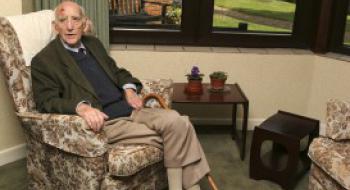New Cross Hospital Dementia Project

New Cross Hospital in Wolverhampton was commissioned to pioneer a new approach to people who come into hospital and who also have dementia.
The New Cross Hospital Dementia Project was funded by the then West Midlands Strategic Health Authority and was lead by project care manager, Grace Hampson. The purpose of the project, which ran from 2009 - 2011, was to create a dementia care bundle, namely identifying practices that, if consistently applied, would lead to a better outcome for patients.
The dementia care bundle included:
Environment
A 20 bed ward was created at New Cross Hospital for people who have dementia as well as the health condition for which they were being treated.
"It's been designed to help engage people with activities and things that interest them," said Grace.
"When people aren't engaged, you find them sitting slumped with their head down in a chair. That's when things start to go downhill.
"If you can engage them in all sorts of ways, they sit up with their heads held high."
Measures to make the ward dementia friendly included
- A toilet door that could be seen whereever you are on the ward, including a bright and highly visible sign
- Other doors which patients do not need to go through, like that of a cleaning cupboard, designed to blend in with the walls
- Everything around the beds within easy reach
- A bell that could be easily seen
- A table, so that those who werewell enough could sit up with others to eat
- A garden and a reminisence area to encourage patients to engage
- Space for relatives to stay if they wanted
Hydration and nutrition
Extra attention was paid to ensure patients were eating and drinking enough.
"One reason why people might not be drinking could simply be that they do not like the drink," said Grace. "We make sure that people get the drinks that they like and some help with drinking if they need it."
Communication
All staff from porters to nurses and doctors were trained in communicating with someone with dementia. They learned about reading body language, making eye contact, how to understand what is happening if a person is not responding verbally.
When patients were admitted to the ward, they were allocated a carer. The carer sat down with the patient and family members and talked in detail about the things that mattered to the patient, from who they have in their family to whether they take sugar in their tea. This enabled the carer to offer indiviudalised person-centred care. At regular intervals - they aimed for around once an hour - patients were checked to see if they were happy or if they needed a drink.
Outreach
Not all patients with dementia were able to be on the dedicated dementia ward. Some, if they have a had a stroke, for example, needed to be on a ward dedicated to caring for people with the same condition. The project had an outreach team going to the wards throughout the hospital to visit patients and staff, enabling them to put the dementia care into practice.
"Our aim is to have a fully dementia friendly hospital - or as near as possible," said Grace. "We have a very ambitious training programme for staff."
Traditionally there has been no dementia training for NHS staff who have not made dementia care their specialism.
"When you don't understand what is happening with people with dementia you become fearful. When people don't respond you lose confidence. When people are ignored, there is never going to be a good outcome," said Grace. "Training everybody in basic stuff is going to make a big difference."
Evaluation
In June 2012, the project was evaluated by a team lead by Professor Dominic Upton of the University of Worcester.
The report concluded:
- Care for people with dementia is delivered in a more personalised manner
- The implementation of the suite of interventions has had a positive impact on patient outcomes on the specialist ward
- Patient and carer satisfaction has improved
- Staff are more skilled and confident, and use a team-based approach to dementia care
- Staff satisfaction has improved
- The project has been beneficial to the organisation as a whole
- There have been some cost benefits for the hospital, although not to the extent that was anticipated
- Some areas require further development as they have not improved as anticipated
The full evaluation report can be downloaded from the list on the left.